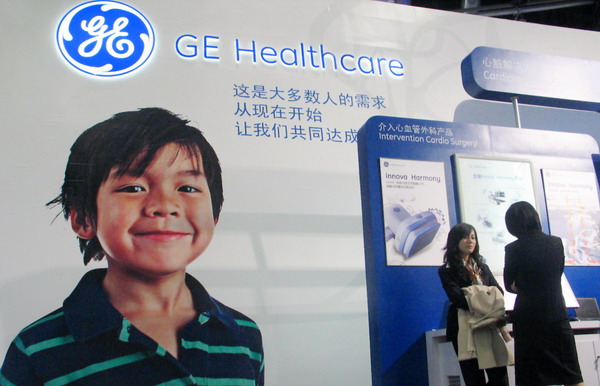Pharma majors hit rural trail
Updated: 2011-12-09 08:09
By Liu Jie (China Daily)
|
|||||||||||
|
A GE booth at a medical equipment exhibition in Beijing. International medical equipment companies regard China as a growth engine of their global business. [Photo / China Daily] |
Foreign companies hope to score big with affordable, portable health devices
During his recent trip to the rural areas in northern China's Hebei province, Feng Ming took particular care to check whether besides luggage, he had with him a smartphone-like device. "My trip is only for this," said Feng, referring to the small white cell-phone-sized device.
"It's not a smartphone, but a scanner, or rather a small clinical scanning room for a professional doctor," said the marketing manager of GE Healthcare, a division of General Electric Company (GE).
He and dozens of his colleagues are currently engaged in marketing the portable, small-sized and multi-function medical device to not only big hospitals but also grassroots clinics in China.
Named Vscan, the device, officially launched in China in May by GE Healthcare, is designed for ultrasound imaging, measurement and analysis of the human body and for clinical applications of various diseases.
"Vscan has received a warm welcome in some big hospitals in key cities, such as Peking Union Medical College Hospital. Actually, given its compact size, high degree of portability and simplified user interface, it is specifically suited for patient examination in remote rural areas, primary care and in special care areas," Feng said.
In addition to Vscan, GE Healthcare has also developed a series of small-sized and movable devices, which help doctors and physicians carry out mobile and remote diagnosis outside key cities and big hospitals.
Such devices have helped the medical equipment provider get a foothold in the residential community hospitals and rural clinics of China, said Rachel Duan, president and chief executive officer of GE Healthcare China.
She said that to penetrate the grassroots market, her company needs to develop products that meet local demands, establish a competent sales network, and provide tailored services based on local products and networks.
"All in all, our expansion (in the grassroots areas) is based on innovation of products and services," said Duan.
GE Healthcare has more than 600 engineers in China, who are focused on development of 17 new types of equipment and technology, 80 percent of which are targeted at the grassroots market.
These products are essentially simple to use, highly portable, low in cost and high in efficiency. A 500-member sales team has also been set up to cover China's second- and third-tier cities and the underdeveloped rural areas.
"We are optimizing our long-distance and online services, which are more convenient and more efficient in this vast market," said Duan, who took up her current post in October 2010.
GE Healthcare is not alone in its efforts, as other multinational medical device peers are also finding their own ways to get a foothold in China's grassroots market.
Siemens Healthcare China expects more than half of its business to come from the rural market by 2015 compared with one-third at present.
The company initiated SMART innovation strategy (simple, maintenance friendly, affordable, reliable and timely to market) in the emerging markets in 2009 to attract customers.
Wu Wenhui, executive vice-president of Siemens Ltd China and president of Healthcare Sector Siemens Northeast Asia, said products tailored to the rural or community market will be tagged at lower prices, but are not necessarily of lower quality.
"High cost performance and good after-sales service are critical components for success in the grassroots market," he said.
Siemens Healthcare, a medical unit of Germany-based Siemens AG, is actively cooperating with local partners, including research institutes, universities, local hospitals and rural clinics to develop and promote products made for residential communities and rural regions.
It has established tieups with more than 500 grassroots hospitals and launched Health China program this year, an initiative projected to donate devices to rural clinics and provide training for local medical staff under cooperation with medical colleges.
GE Healthcare and Siemens Healthcare's archrival Philips Healthcare has also come out with new and affordable products and solutions developed under cooperation with Neusoft Corporation, a domestic IT solutions and services provider.
Desmond Thio, president of Philips Healthcare Greater China, expects annual growth rate of China's high-end medical equipment market to be more than 10 percent in the next few years, while the figure for the middle- and low-end sector is expected to be 30 percent.
Currently, the three top foreign medical device companies account for more than 70 percent of China's high-end market, according to the China Association for Medical Devices Industry.
But with most companies looking to promote affordable equipment tailored for second- and third-tier cities and rural regions, the profit margins of these companies may shrink, say analysts.
However, GE Healthcare's Duan feels that quality and high cost-efficiency will help guarantee better profits for the company.
"The profit margin of these products will not be lower than that of high-end equipment, due to the cost savings brought about by technological development and integration," she said.
Related Stories
China's healthcare more accessible 2011-09-23 07:54
Alliances form in growing pharmaceutical market 2011-08-03 15:13
Chinese market to drive medical firm's business in Asia 2011-07-21 11:08
Expensive healthcare system should be questioned 2011-06-01 16:04
- Chinese shares close lower after data release
- Passengers prepare for annual peak
- Home appliance sales in rural China up 66% in Nov
- Collective wage talks promoted
- Good things in store for Chinese life insurers
- Dotcom could fall into disuse
- Global supermarkets conquer China
- China's Nov CPI up 4.2%, PPI up 2.7%









